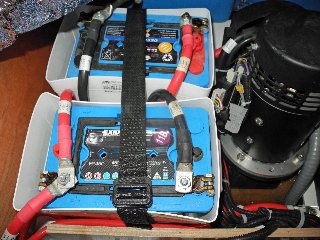
thruster batteries_5664.jpg
Well I hate to say it but it is that time of year again. Time to put the boat to bed for the winter hibernation period. That includes your boat’s battery(s).
This little maintenance chore, if done properly can go a long way toward making sure you get the maximum life out of your batteries. Conversely, if you ignore what I’m about to tell you, your batteries are sure not to last as they should.

Let me begin by emphasizing one key point, there is no need or even a desire to remove the batteries from your boat! The habit some old timers got into with this procedure is right up there with setting a bettery on a concrete floor and the concrete sucking the life out of a battery like some sort of vampire. The concrete isn’t the culprit and never was, and the need to remove batteries from a boat when it goes into storage for the winter is in the same mis-imformed category.
What is important is that the batteries get a full charge before you lay them up for the winter.
All batteries have what is known as a “self-discharge” rate and although it varies somewhat depending upon the type of battery and it’s overall condition, the rate of self-discharge is never more that about 5% per month. So, if you start out at 100% and the boat sits in hibernation for even 5 months, that is still only a 25% loss in charge, bringing things down to a 75% state of charge. That’s good enough to keep the battery from freezing in really cold climates and more than adequate to minimize any sulfation tendencies.
An additional concern, especially on newer boats is the matter of parasitic loads that may contribute to a discharge rate greater than the 5% mentioned above. Most boats today will have equipment on them that will have internal memory or some sort of LED display or monitoring light. These things add up and in some cases can create engough of a cumulative load to actually draw the battery down quicker than desired.
So, you need to make the call here. Is mid-winter recharging practical for you? Or, should you just disconnect the battery(s) so that there is no danger of a parasitic load discharging them too far while in storage. Of course if that is the choice, you’ll have to reset all the pre-programmed stations on the stereo and such in the spring, but that really shouldn’t be a big deal. Personally, I go for the full disconnect on my boat. I get a lot of years of service out of my batteries too.







